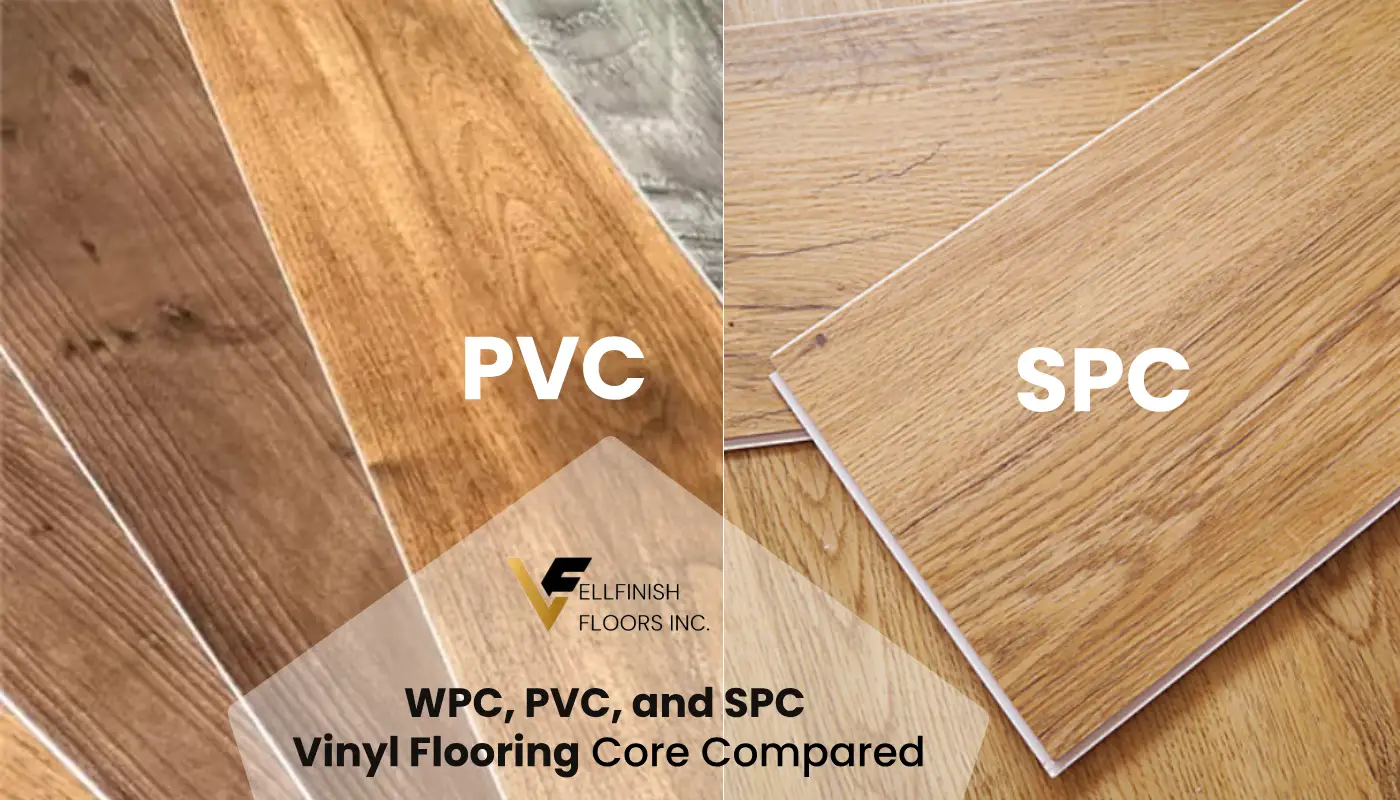WPC, PVC, and SPC Vinyl Flooring Core Compared

When it comes to contemporary flooring, vinyl has quickly become one of the best options for both homeowners and commercial users. Its attractiveness, affordability, and extensive design options make it a viable alternative to hardwood or stone. But not all vinyl flooring is manufactured equally. The composition of the core layer—WPC, PVC, or SPC—of the flooring greatly determines how well the flooring will function in your environment.
In this post, we’ll break down WPC vinyl flooring, PVC vinyl flooring, and SPC vinyl flooring, comparing their strengths, weaknesses, and best applications. By the end, you’ll have a clear idea of which flooring core is the right fit for your home or project.
What is WPC Vinyl Flooring?
WPC (Wood Plastic Composite) vinyl flooring is a designed luxury vinyl flooring with a core constructed of a mixture of wood fiber and plastic polymers. Its new structure renders it more substantial and softer underfoot than regular vinyl floors.
Most Important Features of WPC Flooring:
- Core Material: Wood fibers + thermoplastics.
- Thickness: Typically 6mm–12mm, thicker than most other vinyl.
- Comfort: Provides a softer, padded sensation underfoot.
- Sound Absorption: More quiet by nature with its dense, foamy core.
- Waterproof: 100% waterproof, perfect for kitchens and bathrooms.
Benefits of WPC Flooring:
- Feel Good: Foamed core is more warm and comfortable than SPC.
- Great Insulation: Mutes rooms quieter and more temperature controlled.
- Design Choices: Comes in a huge range of wood and stone looks.
- Installation: Simple click-lock system ideal for DIY installation.
Drawbacks of WPC Flooring
- Less Dense Core: Less stiff than SPC, so can dent under heavy furniture more easily.
- More Expensive: Usually more costly than PVC and sometimes SPC.
- Not Suitable for Heavy Use: Most appropriate for use in residential, not heavy commercial areas.
Best Uses for WPC Flooring:
- Bedrooms and living rooms.
- Residential applications where comfort is the primary concern.
- Apartments and condos that require soundproofing.
- Light commercial applications.
What is PVC Vinyl Flooring?
PVC (Polyvinyl Chloride) flooring, also called vinyl flooring, is the most conventional and popular form of vinyl. It’s made of flexible PVC sheets with no composite cores added to it like WPC or SPC.
Important Aspects of PVC Flooring:
- Composition of the core: 100% polyvinyl chloride without any stone or wood composites.
- Thickness: Generally thinner (2mm–5mm).
- Bending: Softer and more flexible than WPC and SPC.
- Installation: Comes in glue-down, peel-and-stick, or click-lock configurations.
Benefits of PVC Flooring:
- Affordable: Often the cheapest vinyl option.
- Lightweight: Simple to transport and install.
- Versatility: Available in sheets, tiles, and planks.
- Waterproof: Resistant to moisture when sealed properly.
Drawbacks of PVC Flooring:
- Less Long Lasting: Softer layers that dent and scratch easily.
- Comfortable Issues: Can feel more difficult to walk on if installed over concrete.
- Shorter Lifespan: Doesn’t wear as well as WPC or SPC in high-traffic environments.
Best Uses for PVC Flooring:
- Low-traffic residential spaces.
- Rental units that require speedy, budget-friendly updates.
- Temporary flooring options.
- Limited areas such as laundry rooms or basement spaces.
What is SPC Vinyl Flooring?
SPC (Stone Plastic Composite) vinyl flooring is the strongest of the three, with its core consisting of limestone powder, plastic polymers, and stabilizers. This creates a strong, stony-like core that supports heavy traffic.
Main Characteristics of SPC Flooring:
- Core Consists of: Limestone + PVC + stabilizers.
- Thickness: 3.5mm–8mm, thinner than WPC but more dense.
- Strength: Highly resistant and highly dented.
- Stability: Performs exceedingly well with extreme temperature fluctuations.
Advantages of SPC Flooring:
- High Durability: Resists dents, scratches, and heavy furniture.
- Waterproof: 100% waterproof, ideal for kitchens, bathrooms, and basements.
- Temperature Resistant: Expands and contracts better than WPC or PVC.
- Commercial Use: Ideal for high-traffic commercial spaces.
Disadvantages of SPC Flooring:
- Less Comfortable: Harsh underfoot than WPC.
- Sound Transmission: Noises louder than WPC without underlayment.
- Limited Warmth: Cools down in winter relative to WPC.
Best Uses for SPC Flooring:
- High-traffic domestic zones (corridors, living rooms).
- Commercial environments such as offices, restaurants, and shops.
- Bathrooms, kitchens, and basements.
- Domestic homes in regions of high temperature variations.
WPC vs PVC vs SPC Vinyl Flooring: A Quick Comparison
| Feature | WPC | PVC | SPC |
|---|---|---|---|
| Core Material | Wood + Plastic | Pure PVC | Stone + Plastic |
| Thickness | 6mm–12mm | 2mm–5mm | 3.5mm–8mm |
| Comfort | Softer, cushioned | Flexible, average comfort | Rigid, harder underfoot |
| Durability | Good (residential) | Fair (low traffic) | Excellent (high traffic) |
| Waterproof | Yes | Yes (with sealing) | Yes |
| Sound Insulation | Great | Moderate | Fair |
| Cost | Mid to High | Low | Mid |
| Best Use | Residential | Low-traffic, budget projects | High-traffic, commercial |
FAQ: WPC, PVC, and SPC Vinyl Flooring
Q1. What is the most durable vinyl flooring?
The most durable is SPC vinyl flooring because it has a dense stone-based core, which is highly resistant to scratches and dents.
Q2. Which one is better for comfort, WPC or SPC?
WPC flooring is more comfortable because it contains a foamed core, providing greater softness and warmth on the feet.
Q3. Will PVC vinyl flooring last long?
PVC flooring can last 5–10 years in low-traffic areas, but it’s less durable than WPC or SPC in high-use spaces.
Q4. Is vinyl flooring truly waterproof?
Yes, WPC and SPC are 100% waterproof. PVC flooring is also water-resistant but may need proper sealing to prevent moisture seepage.
Q5. Which vinyl flooring is best for commercial use?
SPC vinyl flooring is the best for commercial spaces due to its strength, rigidity, and durability.
Q6. Is SPC flooring cold?
Yes, SPC is colder to walk on due to its stone core, but underlayment can counteract this.
Q7. How much do WPC, PVC, and SPC vary in price?
PVC is the cheapest, SPC is mid-range, and WPC is typically the most costly.
Q8. Can I put these floors in myself?
Yes, all three are found with click-lock systems for self-installation, but PVC is also prevalent in peel-and-stick varieties.
Q9. Which is less noisy, WPC or SPC?
WPC is less noisy due to its foamed core, which silences more sound. SPC might require an underlayment to minimize noise.
Q10. Do these floors add value to a home?
Yes, luxury vinyl flooring (particularly WPC and SPC) can enhance home value since it offers durability, design, and waterproof advantages.
Last Thoughts
When deciding between WPC, PVC, and SPC vinyl flooring, it comes down to your personal requirements.
- If comfort, warmth, and quietness are most important, use WPC vinyl flooring.
- If you are tight on budget and want ease of change, PVC vinyl flooring is the way to go.
- If you require strength, resilience, and commercial-level performance, SPC vinyl flooring wins.
Knowing these distinctions, you will be able to make a well-informed choice and invest in flooring that not only suits your taste but also responds to the functional needs of your area.


